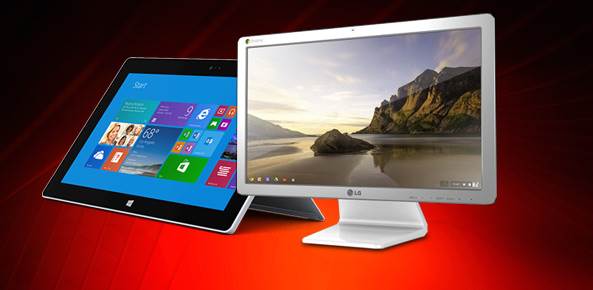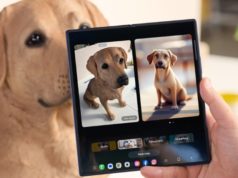![]()
With traditional computers taking up a shrinking portion of consumer demand, forward-thinking manufacturers are likely to debut a wide range of devices early next year that can switch between Microsoft ![]() ‘s Windows and Google’s Android mobile
‘s Windows and Google’s Android mobile ![]() operating system.
operating system.
Several reports suggest that this year’s Consumer Electronics Show in Las Vegas will showcase such hybrid devices that could usher out laptops and desktops as we knew them in the past two decades. Many already make laptops with touchscreens that snap off to be handily used as tablets.
Intel Leads The Way
“The messaging being ushered out for 2014 is that audiences have a choice in OS for their mobile devices and their PCs,” ABI research mobile device analyst Jeff Orr told us.
“Perhaps most surprising is which company is leading this charge: Intel,” Orr said. “While considered late to enter the mobile device market as it defended its PC turf, Intel today offers tablet designs that can load either Android or Windows, or in some cases both system software ![]() platforms.” He cited recent announcements by Asus and Samsung as examples.
platforms.” He cited recent announcements by Asus and Samsung as examples.
The shift comes as Microsoft struggles to blend the old and the new, reacting to the shrinking demand for PCs with its Surface tablets running Windows 8 or Windows RT. But some traditional PC users are frustrated with the touch-oriented Windows 8.
“In the traditional PC space of desktops and notebook computers, the market is Microsoft’s to lose,” Orr said.
“There have always been alternatives when it comes to PC operating systems, though the market reaction has been to go with what is known — Windows. The influence of the smartphone — a highly personalized and customized device that is carried on your person –provides an installed base greater than PCs,” he said.
Orr noted that the mobile ecosystem of Windows for phones and tablets has had “little impact on the decisions of device OEMs and buying audiences.”
IDC’s Worldwide Quarterly PC Tracker this month announced by far the most severe yearly contraction on record for 2013, with a 10.1 percent decrease in shipments.
The Massachusetts-based research firm expects an additional decline of 3.8 percent in 2014, even in emerging markets, with shipments of 300 million roughly equal to the yield of 2008.
IDC analyst Jay Chou said in a statement that well-built computers are in some way a victim of their own successes because they last longer and don’t outlive their usefulness. “PC usage has not moved significantly beyond consumption and productivity tasks to differentiate PCs from other devices,” said Chou. “As a result, PC lifespans continue to increase, thereby limiting market growth.”
PC-Plus Era?
Fox News on Friday quoted two analysts predicting that CES will see manufacturers “rebel” against Microsoft with systems that can run Windows but also Android, so users can simultaneously use productivity software such as Microsoft Office and mobile apps. Creative Strategies’ Tim Bajarin, writing in Time Magazine called such devices “PC Plus.”
But don’t expect an instant revolution, Orr warns. “Stitching together a value proposition — why would an audience segment appreciate the choice and/or ability to load different operating systems on a single device — and not pricing the capability out of reach for most remain challenges to be addressed by mobile device makers in 2014,” he said.
NewsFactor Network







